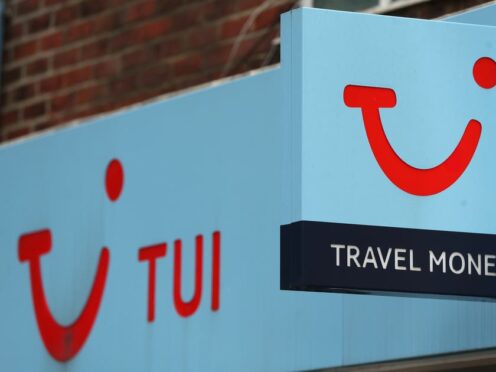Tui shareholders have voted for the travel company to abandon the company’s London listing and focus on Germany.
The move deals another heavy blow to London’s languishing stock markets.
The company said on Tuesday morning that the removal of its shares from trading in the UK would bring “understandable advantages”, and added later that it had a 98.3% majority in favour of only listing in Frankfurt during an afternoon vote.
Three-quarters of the vote was needed for the plan to be approved.
The firm’s stock market listing in London will end on June 24, when it also expects to be admitted on to the Frankfurt Stock Exchange’s Dax index.
Mathias Kiep, chief finance officer of Tui Group, said: “We are pleased that Tui’s shareholders have followed our recommendation and voted in favour of the delisting.
“They have thus also followed the proposal of the investors who brought this issue to our attention last summer.
“Trading in the Tui share had already shifted to Germany to a large extent.
“The advantages of a main listing in Frankfurt are obvious: the structures are simplified, liquidity is centralised and improved in one trading venue, and the simplified structure supports the EU requirements for ownership and control of our airlines.”
On Tuesday, the business said its pre-tax loss was cut from 272.6 million euros (£232.3 million) in the final three months of 2022 to 103.1 million euros (£87.9 million) in the same period in 2023.
During that period Tui made its “highest ever revenues” of 4.3 billion euros (£3.7 billion), up 14.7% on a year earlier.
Around 3.5 million customers used Tui’s services, which include planes, cruise ships and package holidays.
That is a 6% increase on the year before, despite prices increasing.
“Average selling price continues to hold up well, highlighting the strong demand for our products and the consumers’ continued willingness to prioritise spend on travel and holidays,” the business said.
The business also said it is ready to divert resources away from the area close to Israel if conflict in the region worsens.
“We continue to monitor developments both in the Middle East and around the Arabian Peninsula,” Tui said.
“We will retain the option to flexibly adjust capacity from the eastern to western Mediterranean should there be a further escalation of the conflict in this region which has a significant and prolonged effect on customer demand.”
Chief executive Sebastian Ebel said: “We are on track, we are gaining customers and we are growing. We are accelerating our transformation quarter by quarter.
“We have goals that we are consistently implementing. In a persistently challenging environment, people’s high willingness to travel ensures strong economic development in all areas of the group.
“This reiterates our expectations for the year as a whole. We want to increase our revenue by at least 10% and our operating result by at least 25%.”
